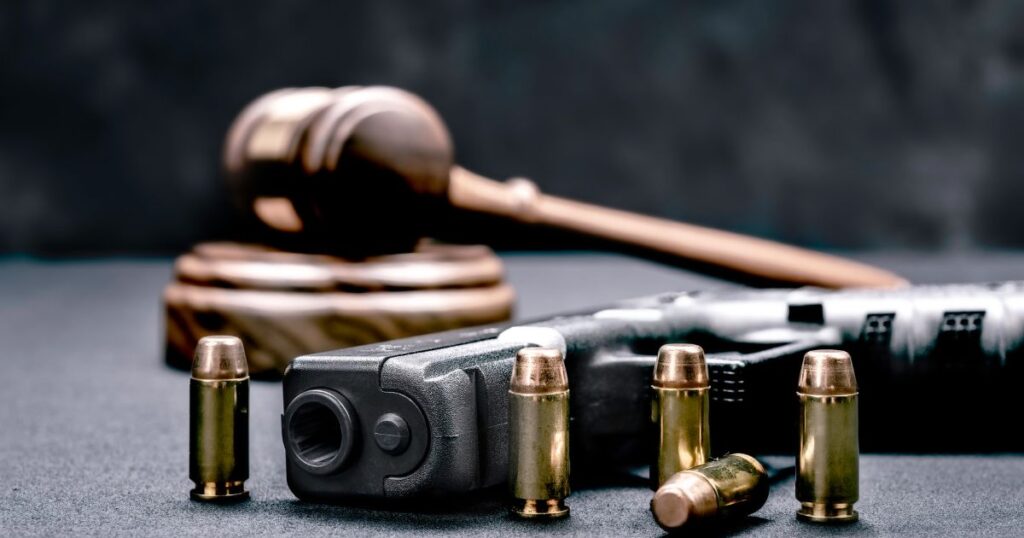A recent federal appeals court decision marks a significant victory for medical marijuana patient gun rights. The 11th U.S. Circuit Court of Appeals ruled that individuals using cannabis in compliance with state medical marijuana programs cannot be automatically disarmed. This ruling deals a major blow to federal efforts to restrict Second Amendment rights for medical marijuana patients, highlighting an important step forward for both constitutional rights and common-sense drug policy reform.
The three-judge panel’s unanimous decision represents more than just a legal technicality—it’s a recognition that responsible medical cannabis patients, who seek gun rights, pose no inherent danger to public safety and deserve the same constitutional protections as other law-abiding citizens.
The Case That Changed Everything for Medical Marijuana Patients and Gun Rights
The lawsuit, originally filed by former Florida Agriculture Commissioner Nikki Fried alongside medical marijuana patients Vera Cooper, Nicole Hansell, and retired law enforcement officer Neill Franklin, challenged federal statutes that prohibit anyone using controlled substances from purchasing or possessing firearms. Under current federal law, medical cannabis patients who honestly answer “yes” on ATF Form 4473 about marijuana use are denied their Second Amendment rights, linking their medical needs with loss of gun rights.
Cooper and Hansell, both registered medical marijuana patients in Florida, were denied firearm purchases after they disclosed their participation in the state’s legal medical cannabis program. Franklin, a retired police officer and current gun owner, wanted to access medical marijuana but feared losing his constitutional rights.
Judge Elizabeth Branch, writing for the panel, made it clear in the ruling: the federal government did not prove that medical marijuana patients are similar to “felons or dangerous individuals” historically restricted from gun ownership.
The court found that the plaintiffs’ use of cannabis for medical purposes under Florida’s regulated program does not make them inherently dangerous or unfit to exercise their Second Amendment rights.
Debunking the “Dangerous Drug User” Myth
The federal government’s arguments in this case revealed the fundamental flaws in prohibitionist thinking. Government attorneys have argued that all cannabis users should be treated alike, claiming that medical marijuana patients are no different from dangerous criminals or individuals with severe mental health issues.
The appeals court rejected this categorization. The judges noted that nothing in the case record suggested Cooper and Hansell had committed any crimes, shown poor judgment, or demonstrated dangerous behavior. Their only “offense” was using doctor-recommended medicine in compliance with state law, highlighting that medical marijuana patient gun rights should not be hindered by outdated perceptions.
This distinction matters enormously. The court acknowledged that medical cannabis patients make rational decisions to use marijuana and would stop using it if they faced the risk of criminal prosecution.
This stands in contrast to individuals struggling with addiction or those whose substance use impairs their judgment and decision-making abilities.
The Real Culprit: Prohibition, Not Cannabis
The appeals court’s decision inadvertently highlights a crucial point about cannabis-related violence that prohibitionists consistently ignore: the overwhelming majority of gun violence associated with marijuana stems from its illegal status, not from the plant itself.
Prohibition pushed cannabis into underground markets, where it became linked to criminal enterprises that used violence to protect their operations. This prohibition-created violence has nothing to do with the pharmacological effects of cannabis and everything to do with failed drug policy. In a regulated environment, medical marijuana patient gun rights concerns would not stem from such systemic issues.
Consider the stark contrast with alcohol, a legal substance that directly contributes to thousands of gun deaths annually through impaired judgment, increased aggression, and domestic violence incidents.
Yet alcohol users aren’t categorically banned from gun ownership. The difference? Alcohol is legal and regulated, while cannabis remains federally prohibited despite widespread state-level legalization, affecting the gun rights of those who opt for medical marijuana over other substances.
Why Cannabis Users Aren’t Inherently Dangerous
The court’s decision aligns with scientific evidence showing that cannabis users don’t pose unique public safety risks. Unlike alcohol, which directly increases aggression and violence, cannabis typically calms users and studies have not definitively linked it to violent behavior.
Medical marijuana patients, in particular, represent some of the most law-abiding cannabis users. They’ve gone through official state registration processes, obtained doctor recommendations, and purchase their medicine from licensed, regulated dispensaries. These individuals are following state law and using cannabis to treat legitimate medical conditions—hardly the profile of dangerous criminals.
The appellate court recognized this reality, noting that Florida’s medical marijuana program is “highly regulated and requires dispensaries to comply with State law as enforced by the Florida Department of Agriculture and Consumer Services.” This regulatory framework ensures quality control, prevents diversion to minors, and creates a paper trail for every transaction.
A Growing Legal Consensus
The 11th Circuit’s decision joins a growing chorus of federal courts questioning the constitutionality of blanket gun restrictions on cannabis users. The 5th Circuit reached a similar conclusion in United States v. Connelly, and the 8th Circuit has also challenged these restrictions.
This emerging judicial consensus reflects an understanding that not all drug use is the same, and that categorical restrictions on constitutional rights must be based on evidence of actual danger, not outdated stereotypes about cannabis users.
The Supreme Court’s evolving Second Amendment jurisprudence, particularly the requirement that gun restrictions be consistent with historical traditions, has created space for these challenges. The government struggles to identify historical precedents for disarming people who use medicine—because no such tradition exists.
Complete Federal Reform
While this decision represents a significant victory, it also highlights the urgent need for comprehensive federal cannabis reform. The current patchwork of state legalization combined with federal prohibition creates an untenable situation where law-abiding citizens must choose between their medicine and their constitutional rights.
The solution isn’t complex: Congress should remove cannabis from the Controlled Substances Act entirely. Descheduling would eliminate the federal prohibition that creates this constitutional conflict and allow states to regulate cannabis like any other legal substance.
Until that happens, medical marijuana patients remain caught in a legal limbo, forced to navigate conflicting state and federal laws while facing potential prosecution for exercising their constitutional rights.
The 11th Circuit’s decision is a step toward recognizing that cannabis prohibition, not cannabis itself, is the real threat to public safety and constitutional rights. As more courts reach similar conclusions, the pressure for comprehensive federal reform will only intensify.
This ruling sends a clear message: responsible medical cannabis patients, therefore, deserve the same constitutional protections as other Americans. Moreover, the federal government cannot strip away fundamental rights based on outdated prejudices and failed drug war logic.





















